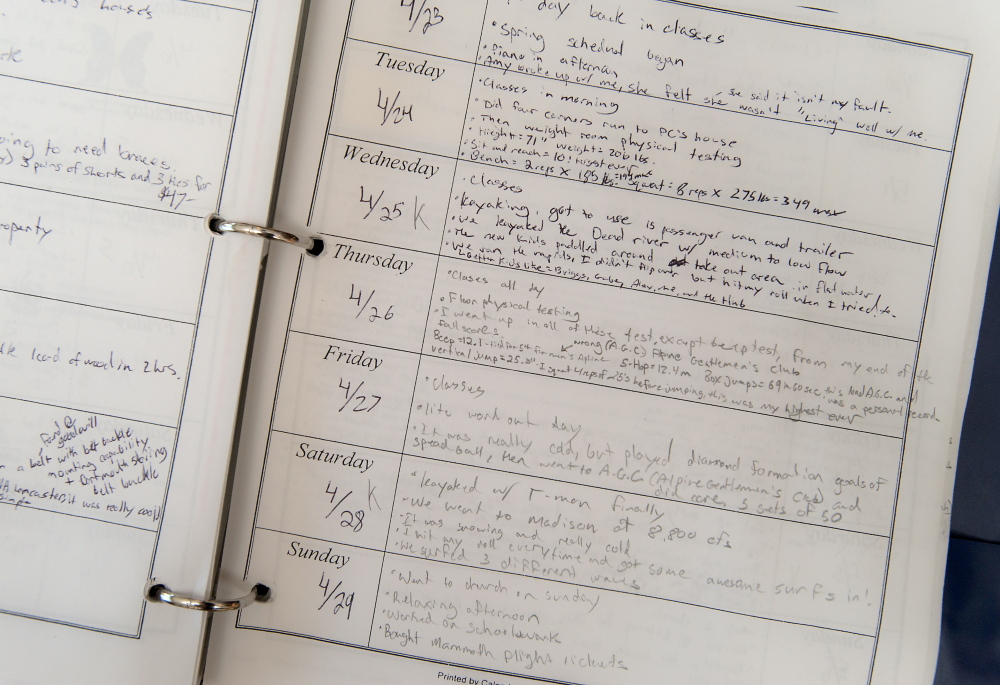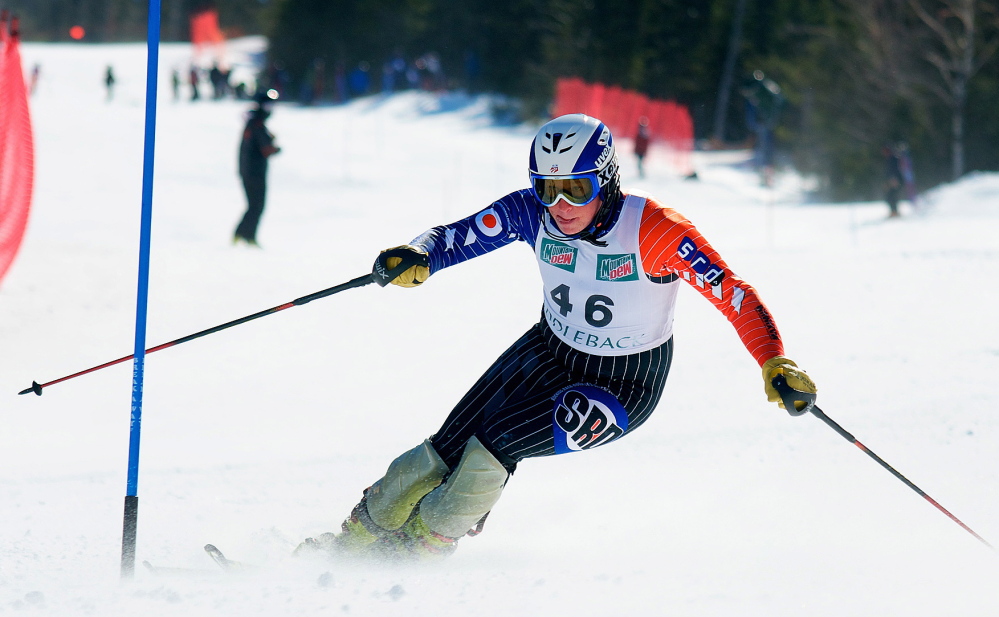Sam Morse has been writing journals since childhood. It wasn’t until three years ago that he realized it was making him a better Alpine skier.
Morse, an 18-year-old Carrabassett Valley native, has been spending much of his time lately training with the U.S. ski team in Park City, Utah. He is a member of the U.S. ski development team, which means he’s on track to make the national team.
And while his ability is obvious to anyone who watches him during a downhill race, he owes some of his success to the words he puts down in his composition notebooks after his workouts.
“It’s really hard to pinpoint any one thing that makes you a better skier,” said Morse. “I think writing helps in that it helps you reflect on what you’ve done. And when you reflect on something, you become better at it.
“We ski and video our workouts, then we go back and look at them to see how we can become better. Writing is the same way.”
Morse isn’t the first athlete to put his thoughts into words – pitchers and hitters have been doing it in baseball for years, charting the tendencies of their opponents, and runners keep training logs – but he is one of a growing number of athletes taking the written word to another level.
Mikaela Shiffrin, the American who won a women’s slalom gold medal at 18 in the Sochi Games, is another.
Before she even skied in the Olympics, Shiffrin told the Associated Press, “I am really psyched to race, and I’ve been here before, in my head, for sure. So to everybody, it’s my first Olympics, but to me it’s my thousandth.”
Morse may not be at Shiffrin’s skiing level yet, but his writing is prolific.
BOOKMARKED IN THE MEMORY
“Sam’s writing is huge,” said Rich Kent, an associate professor in the College of Education and Human Development at the University of Maine. “I’ve never seen such a package of writing. In Sam’s writing you see evidence of planning.”
Kent began using team journals when he was a soccer coach at Rumford High (and later, when it merged with Mexico to become Mountain Valley). He had his players use their journals to analyze the game they had just played and found that they became students of the game, not just participants.
Morse started keeping journals when he was 7 or 8 during family trips. “We would drive everywhere,” said Morse. “We’d take long trips across the country, did all the southern states, to Alaska, all over the place.
“And one day my mom and dad said, ‘Do this.’ ”
They handed him a black composition book and told him to write about his trip, to paste ticket stubs, ski-lift tickets, whatever he could find, into the notebooks. As much as it was a way of keeping him busy, it provided him with the foundation for his writing. The notebooks became training logs, though not in the traditional sense.
Instead of writing how many reps he did during weight training, or how many trips down the mountain he skied, he began writing about what he did when this happened, or that, or that. How did he plant his pole when he approached this turn?
Morse, who still has all his journals at his parents’ house, only occasionally reviews his notes. Simply writing the words down is enough for him.
“It’s more the act of writing it out (that) makes you recall it,” said Morse. “Big events are fleeting in the moment. If you write them down, you bookmark them in your memory.
“It you don’t write anything down, it’s like they never meant anything to you.”
Morse is regarded as one of the nation’s top young male skiers. He has often been compared to Bode Miller, another CVA alum, for his ability to fly down the mountain. In addition to being named to the U.S. development team, he was awarded the Don Metivier Golden Ski Award, presented by the Eastern ski writers association to the most promising male and female Alpine racers. Shiffrin is a three-time winner of the award. Morse finished 17th in the world junior downhill last winter.
“That’s pretty cool,” Morse said of the award. “Even if my ski career never goes another step, that’s a pretty cool accomplishment.”
ONE WAY TO GAIN AN EDGE
Kent is the author of the 2012 book, “Writing on the Bus: Using Athletic Team Notebooks and Journals to Advance Learning and Performance in Sports,” and is a leading proponent of journal writing. He has a resource website – writingathletes.com – and works with college coaches across the nation to establish journal training among their teams.
Kent was introduced to Morse in 2011 by Morse’s English teacher at Carrabassett Valley Academy. Morse brought his collection of journals, thinking nothing of them. Kent saw a great resource.
“Those early journals are fun to look at,” he said. “And they started a habit for Sam, a habit of writing. You see that often when you talk about great athletes, scholars or businesspeople. They create habits of mind about the way they approach work.”
Writing, said Kent, gives Morse an advantage over other skiers.
“The journals provide benefits to learning, opportunities to reflect,” said Kent, who used some of Morse’s passages in his research. “These notebooks allow for a psychological advantage.
“When you think about the computerized work going on in training and the testing being done, writing is one more component that gives you an edge.”
Kent said writing helps reduce stress and anxiety in athletes, increases their self-awareness and helps them cope with challenges.
“In academics we’re told to take notes, write it down three or four times,” said Kent. “Put it in your brain. The very act of writing has a learning component that can help athletes win.”
David Chamberlain, the retired nordic skier from Wilton who represented the U.S. in three world championships, was also a prolific journal writer. And he also worked with Kent, who included examples of Chamberlain’s journals in his book. Writing, said Chamberlain, helped keep him focused.
“It helped process all the things happening around me,” he said. “There are obviously a lot of feelings around racing you have to get hold of and harness. Before a race, writing helped me get into a zone. It wasn’t the only thing I did but it was part of the process.
“And after a race, being able to get back to where I could focus on my training the next week, writing helped me do that. Whether it’s a good race or a bad race, you still have to refocus and move forward.”
Chamberlain, now 38, said he continues to keep a journal, though he doesn’t write daily. “It’s more that I do it when I need it,” he said.
For Morse, the writing is something that should carry on through his career, not that anyone expects it to stop.
Randy Pelkey, the development team coach, is looking forward to working with Morse.
“Sam’s been on our radar for a few years,” said Pelkey. “He’s been working to this for a long time. He’s a solid all-around skier, a strong kid who puts the effort in.”
And when his day is done, he still writes it down.
“It’s not always the perfect body type that wins,” said Morse. “It’s the strangest things that sometimes give you a win.”
Send questions/comments to the editors.






Success. Please wait for the page to reload. If the page does not reload within 5 seconds, please refresh the page.
Enter your email and password to access comments.
Hi, to comment on stories you must . This profile is in addition to your subscription and website login.
Already have a commenting profile? .
Invalid username/password.
Please check your email to confirm and complete your registration.
Only subscribers are eligible to post comments. Please subscribe or login first for digital access. Here’s why.
Use the form below to reset your password. When you've submitted your account email, we will send an email with a reset code.